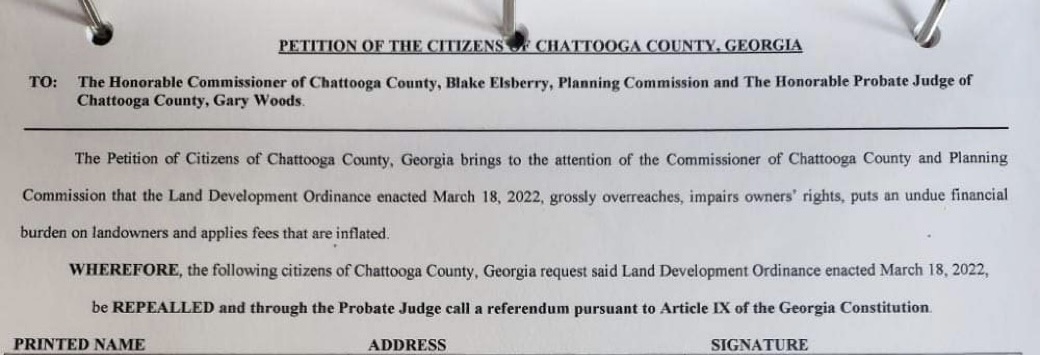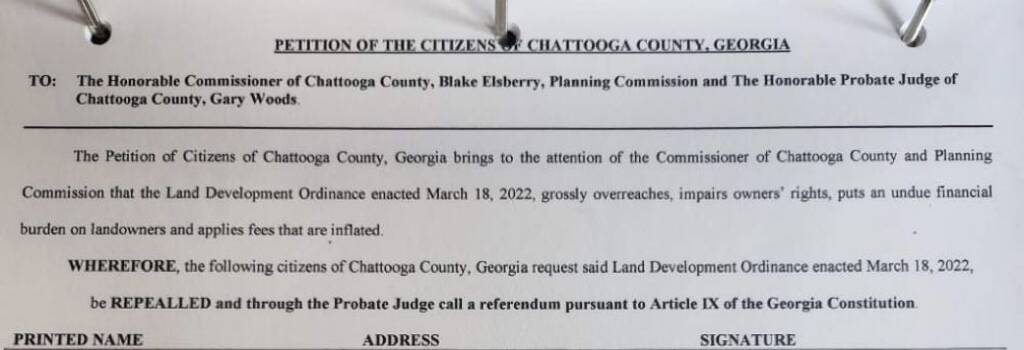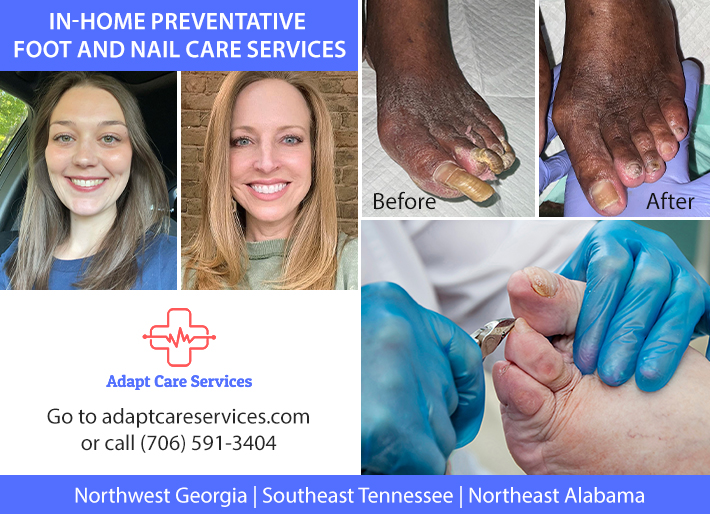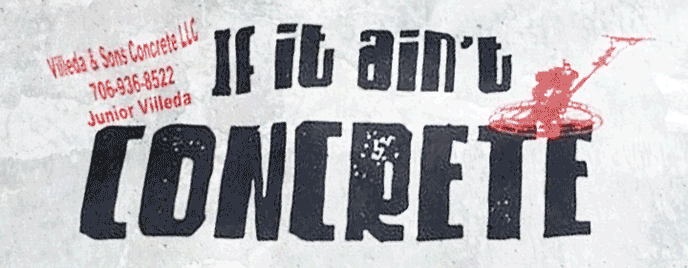
AllOnGeorgia recently sent a media inquiry to Ben Housch, one of the organizers of the Chattooga County Concerned Citizens group regarding the Chattooga County Land Development Ordinance signed by Sole Commissioner Blake Elsberry.
AllOnGeorgia then sent Housch’s concerns and comments to Commissioner Elsberry for his response. Both inquires are below.
AOG: Will you tell me what your biggest concerns are regarding the Chattooga County Land Development Ordinance? and why?
Housch: Before we get into what our concerns are, it’s important to understand what the ordinance is. It’s a set of regulations allowing the Commissioner and the Committee authority to control three main items:
• Dividing your property
• Using your property to produce income
• Multiple family units living on a property (however it does exclude servants)
The main concerns with this are:
• Too much government control over private property.
• Too much regulation will deter the creation and expansion of small businesses.
• Poorly defined and ambiguous terms give the Commissioner and Committee too much authority.
• Exorbitant fees are proposed to review your application to divide your property.
• Paved roads required for access roads.
• A lack of appropriate checks and balances given our current Sole Commissioner form of government. The only recourse you would have if you didn’t agree with the Commissioner’s hand-selected Committee is to appeal to the Commissioner who appointed them to reconsider their action.
The Commissioner has been talking about renaming the ordinance so that people will better understand the intent. He wants to now call it; “Chattooga County Land Development Ordinance for Subdivisions and Commercial Property”. When you apply the definitions in the ordinance to that, what does it really say?
• Development = Any man-made change to the land
• Subdivision = All divisions of a tract or parcel of land
• Commercial = Not defined in the ordinance. The dictionary suggests,” viewed with regard to profit”
Does the scope of those definitions from the ordinance language match the scope of the ordinance the Commissioner is describing to you? Or do you think that having such broad definitions in the ordinance doesn’t sufficiently limit the Commissioner’s power over your property and it might have unintended negative consequences for property owners in the future?
AOG: Have the meetings and amendments helped your concerns at all?
Housch: The discussion has been good and the Committee has shown a willingness to listen, however, they haven’t been nearly as productive as they could have been due to a lack of participation by the Commissioner. The public and the Committee have had this “over-lawyered” document imposed on us by the Commissioner and everyone has been doing their best to work together to minimize the negative consequences of his hasty action. The Commissioner has offered little to no direction on the original goals and objectives nor the background data that establishes the
need for this ordinance.
If I am expected to give up the right to decide for myself how to best use my property for my family’s benefit, the least he could do is establish a sufficient need for it. All we have heard is about one subdivision proposed in Teloga that never would have been approved under current health department regulations and one in the Subligna area that had a poorly constructed private road. Two instances in our 184 years as a county doesn’t sound like an epidemic that requires me to give the Commissioner the ability to decide for me what I do with my land.
That being said, there have been some good ideas generated from the discussions.
• Exempting acreage divisions with tract sizes of 5 acres or more.
• The Farm Bureau came up with a suggestion for how to exempt Agriculture.
• There has been a suggestion on how to exempt handing down your land to future generations. (as long as they don’t want to build a house on it)
• Grey Winstead and Eddie Willingham are working on better defining what is a Small Business. Business with 10 employees or fewer and a building under certain square footage is the current idea they are working on.
• Eddie Willingham suggested that the most restrictive commercial portions of the ordinance be limited to Hwy 27 between Summerville and Trion.
Those are just some of the items discussed, but without participation from the Commissioner and/or the County Attorney it significantly limits the productivity of the discussions. We have no way to know if the above items are going to be accepted or realistically considered by the Commissioner. I would hope that he at least comes and sits down with the Committee and the County Attorney in a public forum to discuss the Committee’s suggestions and offer his thoughts and direction.
The best suggestion by far, was for them to throw this ordinance out and start over. That way the ordinance can be built from a perspective of our county’s need rather than cutting and pasting an ordinance from Lumpkin County (a suburb of Atlanta) that shares very few similarities to our economic situation or way of life.
AOG: How did the meetings come about, are they set up by the group or the board or what? Are there any additional meetings?
Housch: There have been three types of meeting official quarterly meetings of the Planning Committee, public input meetings for the Planning Committee, and educational meetings hosted by us. After the Planning Committee’s first public meeting on August 15th, we didn’t feel like the public was aware of what had been going on in regard to this ordinance. Even today, there are a lot of people that don’t know what this ordinance is and how it will impact them personally.
During that meeting, almost every question asked by the public was met with a lot of “I don’t know” or “We could do a variance for that” by the Commissioner and the Committee. In later meetings, the Committee admitted that the Commissioner got the “cart before the horse” on the ordinance and that additional public input should have been sought prior to it being adopted. Those same sentiments were echoed to the Commissioner prior to adoption. On February 23, the County Attorney suggested the Commissioner get “as many eyes as we can” to give input on the ordinance, and on March 12th he reiterated that he “strongly advised” the Commissioner to seek additional input. On March 10th a representative of the ACCG reviewed the document and recommended that the Commissioner do further study. All three of those emails can be viewed in the Facebook group. I’m not sure what his hurry was to push this ordinance through but I’m sure he had his reasons why he ignored their advice.
After that meeting, we felt that someone needed to educate people about the problems and issues with the ordinance. This ordinance isn’t about just High-Density Residential Subdivisions or Commercial Property like the Commissioner claims. We had hoped that the Commissioner would attend so that he could offer his explanation of the ordinance, share the perceived need for the ordinance, and also hear people’s reactions to what they were learning about the ordinance.
Unfortunately, that ended up not happening and he hasn’t shown up to anyone’s meeting, even the ones hosted by his own Committee, since. As a result of our educating people about what was happening, the Commissioner and Committee decided to have additional public meetings and they have become more receptive to
change than in the meeting in August.
AOG: Do you feel that passing the Chattooga County Land Development Ordinance was an overreach of authority on the part of the sole commissioner?
Housch: Yes, the authority granted to the Commissioner and Committee by this ordinance is outside the historic scope of what the past Commissioners of the county have felt was needed. With the stroke of a pen, the Sole Commissioner of Chattooga County has given himself the authority to control how we use our private property. The Georgia Constitution in Article IX Paragraph IV does say that counties “may” develop these types of Planning and Zoning regulations but it is not a requirement. If he felt strongly about the need to have this increase in his authority, at a minimum it should have been put on the ballot for the people to decide if we wanted to grant him this additional power and the Committee that he has put in place to govern it should have been elected by the people.
AOG: What do you think is the main point of the Chattooga County Land Development Ordinance ?
Housch: In one word, CONTROL.
If you listen to the Commissioner and Committee long enough they will tell you the same. They have given themselves control over how you use your property. Our county is only one of 7 counties in the entire country that use the Sole Commissioner form of government. A big reason why we have used that form of government for so long is that we don’t want “big government” in our lives. Previously, the job was known as the Commissioner of Roads and Revenue. I think that title better explains the expectation of what we want and need for the person we elect to focus on.
The Concerned Citizens group is so concerned about the Chattooga County Land Development Ordinance they have started a petition hoping to stop the ordinance.

“We need signatures from 20% of the registered voters in order to get the ordinance put on the ballot. There has been a strong interest in people signing and we are getting close. Due to technical issues at the Secretary of State’s Office, we’re currently waiting on them to provide the Chattooga County voter roll so that we can start the process of identifying how many signatures we actually have. With one or two more strong pushes to get signatures, we should get there. After we turn in the petition to Probate Judge Gary Woods, they will verify the signatures again
and get it put on a ballot,” Housch explained.
If people would like to sign the petition, they can drop by Prime Realty in Summerville beside the Chattooga County Tax Office. The Concerned Citizens group will post other opportunities to sign as they become available.
If you would like to learn more about the land ordinance, you can go to ChattoogaCitizens.com and follow the link to the Facebook group. Housch has posted links to all of the videos from the meetings, all the documentation he has about the ordinance, and any presentations shown at the meetings. “Don’t take our word for it though, go look at the information and decide for yourself what you think about the ordinance,” he said.
You can view the 88 page Chattooga County Land Development Ordinance document below.
2022 Land_Subdivision Ordiance_WithTableOfContents_202210030930007903
About the Chattooga County Land Development Ordinance Commission via County Website:
Created in 2022, the Chattooga County Land Development Commission oversees the activity of both commercial and residential subdivisions within the county, using the Chattooga County Land Development Ordinance, which lists the purpose of the commission below:
(1) To promote health safety, morals, convenience, order, prosperity, and general welfare of the present and future inhabitants of the county.
(2) To encourage economically sound and stable land development.
(3) To encourage the development of economically sound and stable communities.
(4) To ensure the provision of required streets, utilities, and other facilities and services to new land developments;
(5) To ensure the adequate provision of safe and convenient traffic, access, and circulation both vehicular and pedestrian, in new land developments.
(6) To ensure the provision of needed natural areas, public open spaces, and building sites in new
developments through the dedication or reservation of land for recreational, educational, and other purposes.
(7) To ensure, in general, the wise development of new areas, in harmony with the comprehensive plan of the county.
(8) To lessen congestion in the streets and roads, to secure safety from fire and other dangers, to provide adequate light and air, to promote such development of land as will tend to facilitate and conserve adequate provision for transportation, water supply, drainage, sanitation, and for other purposes.
The members of the commission are as follows, and are all volunteers:
- Eddie Willingham (Chairman)
- Myra Green
- Grey Winstead (Vice Chairman)
- Ansley Smith (Secretary)
- Lee Hamby
- BJ. Hall (Staff Member/Director)
Click Here to Download the Ordinance
Click Here to Download the Preliminary Plat Application
Land Development Meetings are held on the 2nd Thursday of the following months: January, April, July, and October. They will be held at the Chattooga County Civic Center (44 Hwy 48 Summerville, GA) at 6PM EST.
AllOnGeorgia sent Housch’s concerns to Sole Commissoner Elsberry, below is his response.
“I am pleased with the interest from members of the community in giving input in what they would like to see in the ordinance moving forward. While I believe Mr. Housch’s comments come from a genuine place of concern, the ordinance is not what he makes it out to be. I have to admit I was taken aback by some individuals in the confrontational way they have addressed it, as I have always made myself available to talk to anyone and will continue to do so. Even so, I have had great conversations throughout this process with citizens explaining the ordinance and why it is needed since it was enacted.
We had two public meetings that were heavily advertised by all the media outlets before we enacted the ordinance. (See attached photos.) Both meetings had good attendance with people like local realtor Steve Baker who after reading the ordinance gave a speech about how important it was, that it was long over due, and thanked us for getting it done.
We advertised for people who were interested in serving on the committee, and once established, I attended the first official meeting of the committee to answer any questions or concerns. I believe this meeting was recorded. After this meeting I had some really good conversations with many residents who had further questions and answered their concerns. This meeting gave me the opportunity to meet a few people I had not had the pleasure of meeting with yet. One of which was Mr. Housch’s father who shook my hand, and thanked me for answering questions.
After that meeting I felt that it was important to make sure this ordinance became what it was intended to be. And that is a process in which the public takes control of the development in the county. With that I decided to stay away from meetings as the committee continued working on the ordinance and taking in community input. I
felt my attendance would only allow for the meetings to get off topic, and we needed them to remain constructive.
The committee has done a fantastic job in taking ownership of the process, listening to community input, and learning in what is a very new situation for our county.
During this process there has been some misconceptions about this ordinance, one of which is this is a push for county wide zoning. This ordinance is not zoning or a segway into zoning. Zoning is by definition exactly what it sounds like. It places all properties into zones. Then those properties are only allowed to be used for what it is zoned for, unless you go through the process and get it rezoned. That involves a zoning committee and a final approval by a commissioner/commissioners as well.
I am not an advocate for zoning. I believe in a county as small as ours it would cause more issues than it would solve. I am also against the impact it would have on individual land owners.
I am also against too much government control, however we are experiencing an unprecedented migration into the rural areas and the need for some protection for our communities is imperative. That is why I feel this ordinance is a good balance between protecting our communities and protecting the rights of individual home
owners.
Whether you are for it or against it, development is coming. It is imperative we have in place something that protects our property owners and ensures we have growth that is smart, stable, and a benefit to the communities in the county for years to come.
I do not have the luxury of looking at only the here and now. I need to look at 10, 20, 30 years from now, and what effects current trends could have on our county. We needed something that would protect the land in the county and continue to give the public a say long after my tenure is done.
In my short time in this office so far I have noticed some concerning things involving the history of development in the county.
1.There has been no avenue for which gave the public a say in the developments that have come into the unincorporated areas of the county.
2. The developments happened with no thought of the impact on surrounding residents, infrastructure, drainage, or roads. And most infrastructure was then paid for by tax payer dollars, and the burden to improve and maintain fell on the tax payers. We needed something in place so that tax payers are not left holding the bill in perpetuity after developers had made their profit and left.
3. As we see increased interests by developers from all over the United States in North Georgia there has been a very large increase in the amount of interest in Chattooga County by development groups and investment firms. While this can be a good thing, left unmanaged it can open the door to “bad actors” who may not have the best interest of the community at heart. Chattooga County needs growth but we need smart growth. Growth for the sake of growth, or growth at all costs is not smart planning for the future. We have to grow while maintaining the attributes that makes Chattooga County great.
4. When a resident would come to my office with concerns or complaints on a development near them, the county had very little means to help. Without something in place to be able to manage the developments coming in I had no way to help, and we leave our county vulnerable to potential problems down the road. I have had numerous drainage issues, road issues, and neighbor vs. neighbor disputes that could have been avoided if the proper work by the developers had been done at the beginning.
5. I noticed an unlevel playing field among developers with no standards for them to go by.
6. I noticed more of our large farms being sold and auctioned off, and why we always hope the next generation will continue to farm, that is not always the case. With more large farms being sold we needed something in place to make sure we have quality developments coming in and ward off some of the potential developments that could be detrimental to the communities around them.
7. Developers historically have not been required to present their projects to the public. I believe that needs to happen. Any developer should have no problem presenting their plans to the public and should be required to do so.
8. We continue to see unprecedented growth in the North Georgia Region and we need to have something in place to protect the land of Chattooga County and ensure its sustainability for future generations.
9. Tax payer dollars were paying for the infrastructure costs for residential developers that were making a profit off of a private property development. That had to stop. At the state capital we are seeing a huge push by lobbyists hired by developers and investors to get legislation passed that would mandate state building regulations on local governments, and take away local control. These preemptive bills would take away the individual county and/or city’s ability to regulate the development in their communities as needed, or what is referred to as “home rule”. We are also seeing a huge push to not allow local government to be allowed to manage “build to rent” subdivisions that are built by developers and then sold to investors. Basically setting up an absentee landlord situation.
For some communities who have strict standards these preemptive bills would mean lowering the regulations in their counties or cities, but for counties like Chattooga it would force us to raise our regulations. I am against any legislation that would mandate rules on counties and cities and take away our ability to manage our own
communities. Every county and city is different and should be allowed to regulate by what they see their needs are locally. Developers and local governments need to work together in the development of the communities they serve.
In my opinion state mandated regulations would hinder that relationship. That is why it was important to pass this ordinance that only pertains to subdivisions and commercial properties, protects local home owners, and that is maintained by the local public interest. For example: In state legislature the House and the Senate both have to vote yes on a bill for it to pass to the Governor. Then the Governor signs it into law. Now the Governor can decide to sign every bill or veto every bill, but if the bill passes both house and senate then he/or she will be pressured to follow the will of the legislature. If you use that example for our ordinance, the committee as the “senate” and the public as the “house”, this insures that no matter what the political climate of the commissioners office is, the commissioner is pressured to follow the will of the of the people. So if both the committee and the public decide, the commissioners office will be pressured to follow suit. This insures that long after my tenure, that the people are educated and have management control in the development of the county. There is also appeals procedures that can be utilized by the developers. This keeps checks and balances throughout the application process.
The fees cited in his most recent post of concern are fees which are included in the ordinance Mr. Housch and some others were advocating for from Washington County. So I am somewhat confused as to why he was upset about fees in the ordinance he was advocating for. Never the less, we are not adopting the Washington County ordinance.
I do know that the county attorney is now drafting the amended ordinance which will hopefully clarify and simplify the process. That draft will have to go to a committee meeting for a vote, then if approved it will come to me for any input I may have. If no input is needed and it has been approved in committee, then I can approve it to go for final draft. If I have any input then those suggestions will go back to the committee for a meeting on those and another vote before a final draft. Continuing the checks and balances process.
There has been some inaccurate information shared over the past couple months about the ordinance and it’s intentions.
It is intended to and will protect the home owners of Chattooga County. This ordinance is not zoning or a “gate way” to zoning.”













